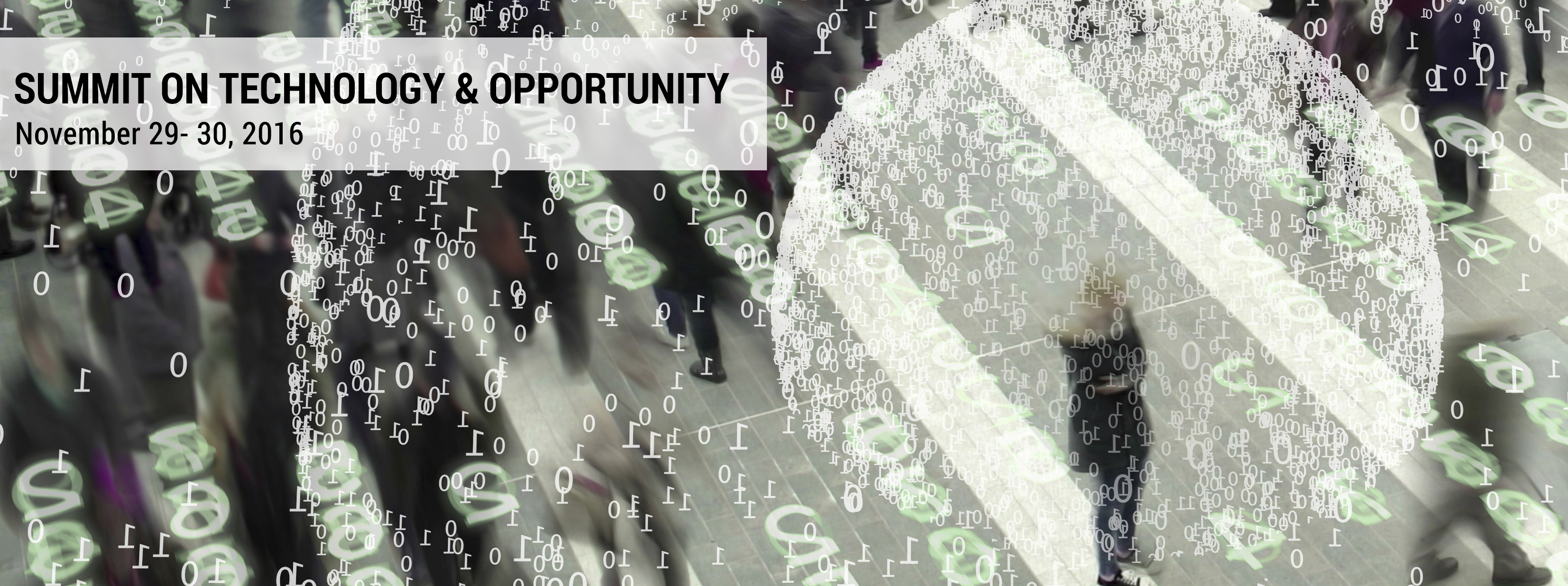A conference hosted by the White House, the Chan-Zuckerburg Initiative, and the Stanford Center on Poverty and Inequality.
November 29, 2016
Marc Tessier-Lavigne, President, Stanford University; David B. Grusky, Director, Stanford Center on Poverty and Inequality
Big Bets, Big Data and Reinvention in Government and Markets
Jim Shelton, President for Education, Chan-Zuckerberg Initiative
Data-Driven Innovation: National, City, Community
Matt Klein, CEO, New York City Center for Economic Opportunity; Rey Faustino, Executive Director, OneDegree; Simone Brody, Executive Director, What Works Cities; Aden Van Noppen, Senior Policy Advisor, The White House Office of Science and Technology Policy; Tara McGuinness, Senior Advisor, The White House
Technology to Facilitate Financial Access (no video available)
Leigh Philips, President, Earn; Ana Thompson, Chief Financial Officer, Opportunity Fund; Louis Caditz-Peck, Director of Public Policy & Regulatory Affairs, Lending Club; Premal Shah, Founder & CEO, Kiva; Caroline Whistler, CEO & Co-Founder, Third Sector
Data-Driven, Outcomes-Focused Government: The Value Proposition
Dave Wilkinson, Director, White House Office of Social Innovation
What Works? Maximizing Impact Through Results-Driven Government
Caroline Whistler, CEO & Co-Founder, Third Sector; Michele Jolin, President & Co-Founder, Results for America; Josh McGee, Vice President, Laura and John Arnold Foundation; Lenny Mendonca, Director Emeritus, McKinsey & Co.
Collaborative Workshop with All Gunn (no video available)
Two (Contrasting) Views of the Future
Martin Ford, Best-Selling Author & Futurist; Tim O’Reilly, Founder & CEO, O’Reilly Media; Rob Reich, Faculty Co-Director, Stanford Center on Philanthropy and Civil Society
Reviving the American Dream: New Lessons from Big Data
Raj Chetty, Professor of Economics, Stanford University
The Effect of the Affordable Care Act on Health Insurance Coverage and on the Labor Market
Mark Duggan, Director, Stanford Institute of Economic Policy Research
David B. Grusky, Director, Stanford Center on Poverty and Inequality
Stanford Poverty and Technology Lab
Elisabeth Mason, Founding Director, Stanford Poverty & Technology Lab
Lightning Talks - Technology and Mobility: Education as a Test Case
Nicole Hurd, Founder & CEO, College Advising Corps
Alex Bernadotte, Founder & CEO, Beyond 12
Data and Evidence for Outcomes-Driven Policy
Laura Arnold, Co-Chair, Laura and John Arnold Foundation; Bryan Desloge, President, National Association of Counties; Amy O’Hara, Chief, Center for Administrative Records Research and Applications, U.S. Census Bureau; Paul Brest, Faculty Co-Director, Stanford Center on Philanthropy and Civil Society
The Future of Online Education
Anant Agarwal, CEO, edX; John Mitchell, Professor of Computer Science, Stanford University
Policing, Prisons and a New Vision for Public Safety and Equality
Brittany Packnett, Co-Founder of Campaign Zero and Member of the President’s Task Force on 21st Century Policing; Roy L. Austin, Jr., Deputy Assistant to the President for Urban Affairs, Justice and Opportunity, The White House; Lenore Anderson, Executive Director and President, Californians for Safety and Justice/Alliance for Safety and Justice; Clarence Wardell, U.S. Digital Service
November 30, 2016
Strengthening the Ecosystem of Opportunity: A Conversation with Steve Ballmer
Steve Ballmer, The Ballmer Group; Elisabeth Mason, Founding Director, Stanford Poverty & Technology Lab
Poverty, Opportunity and Common Ground
Megan Smith, U.S. Chief Technology Officer, The White House Office of Science and Technology Policy
The Honorable Libby Schaaf, Mayor of Oakland; Moderator: Jen Pahlka, Founder & Executive Director, Code for America
Collaborative Workshop with Allen Gunn (no video available)
Lightning Talks - The Big Idea
Jay Nath, Chief Innovation Officer, Office of Mayor Edwin Lee
Eric Dawson, CEO & Co-Founder, Peace First
Leanne Pittsford, Founder, Lesbians Who Tech
Byron Auguste, President & Co-Founder, Opportunity@Work and Ryan Burke, Special Assistant to the President for Economic Policy, The White House
Antwi Akom, Executive Director, I-SEEED
Lunch Conversation: The Future of Jobs and the Question of Basic Income
Chris Hughes, Co-Founder, Facebook; Sam Altman, President, Y Combinator; Juliana Bidadanure, Assistant Professor of Philosophy, Stanford University; Natalie Foster, Strategic Advisor to The Aspen Institute
White House Data-Driven Justice Initiative
Dave Wilkinson, Director, White House Office of Social Innovation; Fraser Nelson, Director of Data and Innovation, Salt Lake County; Roy L. Austin, Jr., Deputy Assistant to the President for Urban Affairs, Justice and Opportunity, The White House
Tech in Action to Tackle Homelessness: Santa Clara County Project Welcome Home Demo
Greta Hansen, Chief Assistant County Counsel, County of Santa Clara; Alice Yu, Palantir Technologies; Michelle Barnaby, Abode Services
Emmett Carson, President, Silicon Valley Community Foundation; Daniel Lurie, CEO & Founder, Tipping Point Community; Larry Kramer, President, Hewlett Foundation; Meg Garlinghouse, Head of LinkedIn for Good
Tech Talent for Public Impact and the Way Ahead
Todd Park, Former U.S. Chief Technology Officer and Current Advisor for Technology, The White House; Ryan Burke, Special Assistant to the President for Economic Policy, The White House; Raquel Romano, U.S. Digital Service; Aden Van Noppen, Senior Policy Advisor, The White House Office of Science and Technology Policy; Clarence Wardell, U.S. Digital Service
Lightning Talks - Innovations That Empower
Christina Lewis Halpern (Founder & Executive Director) and Kofi Adu, All Star Code
Mauricio Lim Miller, CEO, Family Independence Initiative
Jim Shelton, President for Education, Chan-Zuckerberg Initiative
------------

The Stanford Center on Poverty and Inequality is a nonpartisan research center dedicated to monitoring trends in poverty and inequality, explaining what’s driving those trends, and developing science-based policy on poverty and inequality. The Center, a program of the Institute for Research in the Social Sciences at Stanford University, supports research by new and established scholars, trains the next generation of scholars and policy analysts, and disseminates the very best research on poverty and inequality.
The Stanford Poverty and Technology Lab is dedicated to building new products that exploit the capacity of technology to reduce poverty. The lab, which brings together teams of students, faculty, and Silicon Valley leaders, will build such technology-driven innovations as one-stop centers for poverty-reducing programs and services, job referral and connective services for low-wage and low-skill labor, and interventions that increase and improve information about opportunities for adults and children. The no-holds-barred objective: To develop a suite of ambitious “Silicon Valley” anti-poverty interventions that change the face of poverty in the Bay Area, the U.S., and beyond.

